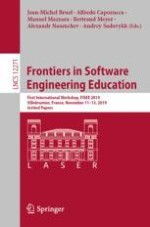This book constitutes invited papers from the First International Workshop on Frontiers in Software Engineering Education, FISEE 2019, which took place during November 11-13, 2019, at the Château de Villebrumier, France.
The 25 papers included in this volume were considerably enhanced after the conference and during two different peer-review phases. The contributions cover a wide range of problems in teaching software engineering and are organized in the following sections: Course experience; lessons learnt; curriculum and course design; competitions and workshops; empirical studies, tools and automation; globalization of education; and learning by doing. The final part "TOOLS Workshop: Artificial and Natural Tools (ANT)" contains submissions presented at a different, but related, workshop run at Innopolis University (Russia) in the context of the TOOLS 2019 conference.
FISEE 2019 is part of a series of scientific events held at the new LASER center in Villebrumier near Montauban and Toulouse, France.
